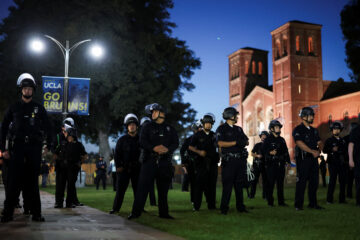US House votes to arm Syrian rebels
Reuters
The U.S. House of Representatives approved President Barack Obama\’s plan on Wednesday to train and arm moderate Syrian rebels, but questions remain over whether it will give them the advanced weapons they say they need to defeat Islamic State militants.
The House voted 273-to-156 to authorize the plan, a test of support for Obama\’s stepped-up campaign to "degrade and destroy" Islamic State fighters who have seized a third of both Iraq and Syria, declared war on the West and seek to establish a caliphate in the heart of the Middle East.
Written as an amendment to a stopgap spending bill, the measure does not include any money to pay for the arms and training. It passed with support from Democrats and Republicans, but also significant opposition from members of both parties.
Voting for the amendment were 159 Republicans and 114 Democrats, while 71 Republicans and 85 Democrats voted against.
The spending bill – including the training plan – will only go to Obama to be signed into law after it passes the Senate, expected to come as early as Thursday.
Facing resistance from war-weary lawmakers in Obama\’s own Democratic party, the administration reached across the aisle to Republicans for support, a rare bipartisan moment in an otherwise polarized Congress.
At an annual picnic for congressional members he hosted on Wednesday night, Obama thanked House members from both parties "who came together today to pass an important component of our strategy for dealing with this terrible terrorist organization."
A Reuters/Ipsos poll showed that while Americans support Obama\’s campaign of air strikes against Islamic State militants, they largely oppose a long military campaign against the group.
The authorization backed by the House lasts only until Dec. 11, the day the spending bill expires. The bill allows the Pentagon to later submit requests to shift funds within the budget if it decides it needs funds to pay for the program.
The amendment does not provide details about the training plan, prompting lawmakers to fear that a "yes" vote could mean authorizing shipments of military equipment that might end up in the wrong hands and possibly even kill Americans.
"There are too many unanswered questions for me to support this amendment," said Representative Barbara Lee, a California Democrat. "How will we ensure that the United States weapons we are providing to Syrian rebels will not get into the wrong hands, as they did with the rebels we supported in Libya?"
The amendment does not include $500 million the White House says it needs to arm and train the rebels, who have been waging a three-year battle against Syrian President Bashar al-Assad. It was written to quickly provide the authority Obama wanted while avoiding a debate on the money.
Oubai Shahbandar, a senior adviser to the Syrian National Coalition, a Western-backed political opposition body, called the House vote "an important step forward" in establishing a partnership between Washington and the Syrian opposition.
"We worked hard to make the case that the Free Syrian Army is the sole solution to degrading and defeating ISIS. We have a long road ahead, but the overwhelming support in Congress for our cause is encouraging," he told Reuters in Istanbul.
Obama said in a nationally televised speech last week that he wanted to train and equip Free Syrian Army rebels to "strengthen the opposition as the best counterweight to the extremists" and to prevent U.S. troops from "being dragged into another ground war."
Fears of a deeper U.S. troop involvement were fanned on Tuesday by General Martin Dempsey, chairman of the U.S. military\’s Joint Chiefs of Staff, who raised the possibility that American troops might need to take on a larger role in Iraq\’s ground war.
Defense officials have said they expect to recruit and train about 5,000 of the moderate rebel fighters.
U.S. military officials say there is support within the Pentagon for supplying the rebels with weapons beyond small arms and ammunition, including battlefield artillery, anti-tank rockets and mortars.
Republican Representative Tom Cole of Oklahoma, a member of the House Defense appropriations subcommittee, said the program could start with small arms and then possibly graduate to heavier weapons, such as "armored personnel carriers, artillery, real air defense capability" but declined to say whether such plans had been discussed in classified briefings.
Source: Reuters
[do_widget_area inner_adsbar]











